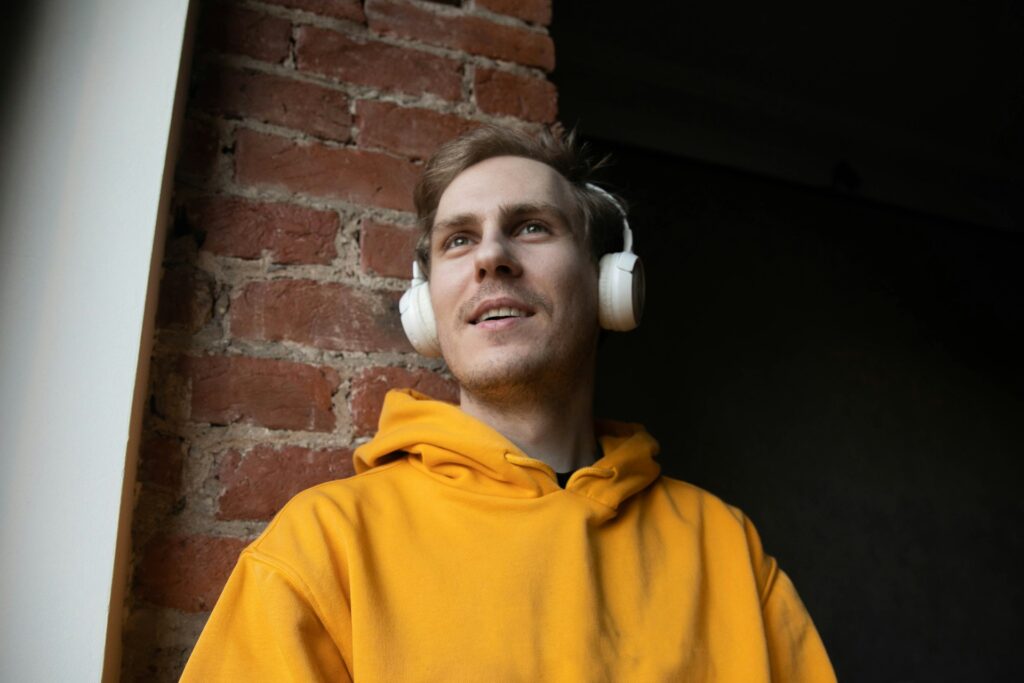It’s easy to underestimate the impact of music when you’re stuck in a low place.

However, the truth is, the right song at the right time can do far more than just lift your mood for a moment. It taps into something deeper—helping you feel seen, steady, or even just less alone. There’s a growing body of research now backing what many people already feel instinctively: music can genuinely help with depression, and not just in some vague, feel-good way. Here’s how.
1. It helps regulate emotions when everything feels too much.

When you’re depressed, emotions can feel unpredictable or overwhelming, like they hit out of nowhere or linger way too long. Music gives those feelings shape. A song that mirrors your emotional state can actually help you process what you’re feeling, rather than trying to push it away or numb it. That sense of being understood, even by lyrics or melodies, can be surprisingly grounding.
Even instrumental music plays a role here. Certain rhythms, keys, and progressions can match your internal state and gently guide you toward calmer territory. It’s not about forcing yourself to be happy, but about helping you move from chaos to clarity, one track at a time.
2. It can interrupt negative thought spirals.

One of the hardest parts of depression is getting stuck in your own head. Thoughts repeat, spiral, and grow heavier with every loop. Music acts like a pattern-breaker. When you put on a track that draws you in, it redirects your focus, even if only slightly, and breaks that mental loop just long enough to breathe.
Lyrics, melodies, or even just the beat can pull you out of your usual narrative and into something else. It’s not a permanent fix, but it can buy you space. That space, however small, can be the difference between feeling completely overwhelmed and feeling like maybe you’ll get through the next hour.
3. It brings back memories of better times.

Music has a strange way of unlocking memories—sometimes ones you didn’t even realise you were holding onto. That song you played on repeat during a road trip, or the one your mum used to hum while cleaning, can bring back a time when things felt lighter, easier, or more connected.
When you’re depressed, it’s easy to forget that you’ve ever felt okay. However, music can remind you of those moments—not to make you feel guilty or nostalgic, but to prove that good feelings aren’t gone forever. They existed once, and they can exist again. That kind of reminder matters more than it gets credit for.
4. It gives you a sense of control over your environment.

Depression often comes with a feeling of helplessness. You can’t control your brain, your mood, or your motivation, and it’s exhausting. Choosing your own music, though, can give you a tiny piece of that control back. It’s one of the few decisions that doesn’t feel overwhelming, but still has a noticeable effect on your atmosphere.
Whether it’s putting on lo-fi beats to soften the quiet or cranking up something loud and chaotic to match your mood, you’re actively shaping your space. And when everything feels like it’s happening to you, that kind of agency can be quietly empowering.
5. It connects you to people, even when you’re isolating.

Isolation is one of depression’s most persistent symptoms. You stop talking to friends, you skip events, and before you know it, you’re floating through the days alone. But music can still be a link to the world. When you hear a song that someone else wrote about the exact thing you’re feeling, you realise you’re not the only one who’s been here.
Streaming playlists, sharing songs with a friend, or even just reading YouTube comments under a sad tune can be surprisingly comforting. It reminds you that there are other people out there—maybe thousands—who have felt what you’re feeling and got through it.
6. It can help with physical movement (even if it’s small).

When depression makes even getting out of bed feel monumental, music can sometimes be the nudge that gets you moving. A single upbeat song might not fix your energy levels, but it might help you stretch, tidy up a corner of your room, or even just sway a bit while you sit. And any movement is better than nothing.
The rhythm gives your body something to sync with, which makes it easier to override the sluggishness. Over time, these tiny movements add up, creating a sense of momentum when you’ve felt stuck for days—or weeks—on end.
7. It gives your mind a creative outlet.

For people who play an instrument, write lyrics, or even just make playlists, music offers a creative release. And creativity, even in small doses, can be deeply healing. It pulls your focus outside of yourself and channels all that built-up emotion into something expressive.
You don’t have to be “good” at music to benefit from it. Singing in the shower, tapping out rhythms on a desk, or quietly humming can all help change your internal state. The act of creating, even something small, reminds you that you’re still capable of building something from how you feel.
8. It helps restore routine and rhythm to your day.

Depression often wipes out any sense of structure. Days blend together, sleep cycles fall apart, and everything feels unanchored. But having a morning playlist, a wind-down mix for the evening, or just a song you always play while brushing your teeth can start to build that rhythm back in a low-pressure way.
Music marks time in a way that doesn’t feel forced. It gives your day a shape again, even if that shape is just made of quiet moments with headphones in. That structure, no matter how soft, can help you feel like you’re slowly reconnecting with the world around you.
9. It creates space for tears, release, and relief.

Sometimes the only way forward is through. Music can help unlock the emotions you’ve been trying to hold back or suppress—especially when you’ve been too numb to even cry. A powerful ballad, a lyric that hits the mark, or a haunting melody can tip the scales and let it all out.
And that release can be such a relief. Crying to music might not solve the problem, but it creates a moment of honesty, which is something depression often strips away. In that moment, you’re not pretending. You’re just feeling, and sometimes that’s enough to start healing.
10. It’s always there when nothing else is.

Therapy can be expensive. Friends can be unavailable. Motivation can be nowhere to be found, but music is always there. It’s free, it’s portable, and it doesn’t expect anything from you. You don’t have to explain yourself, perform, or even move. You just press play. While music isn’t a cure for depression, it’s a companion. One that doesn’t judge, doesn’t get tired, and doesn’t need you to be okay first. In a world that often feels overwhelming, that’s no small thing.


